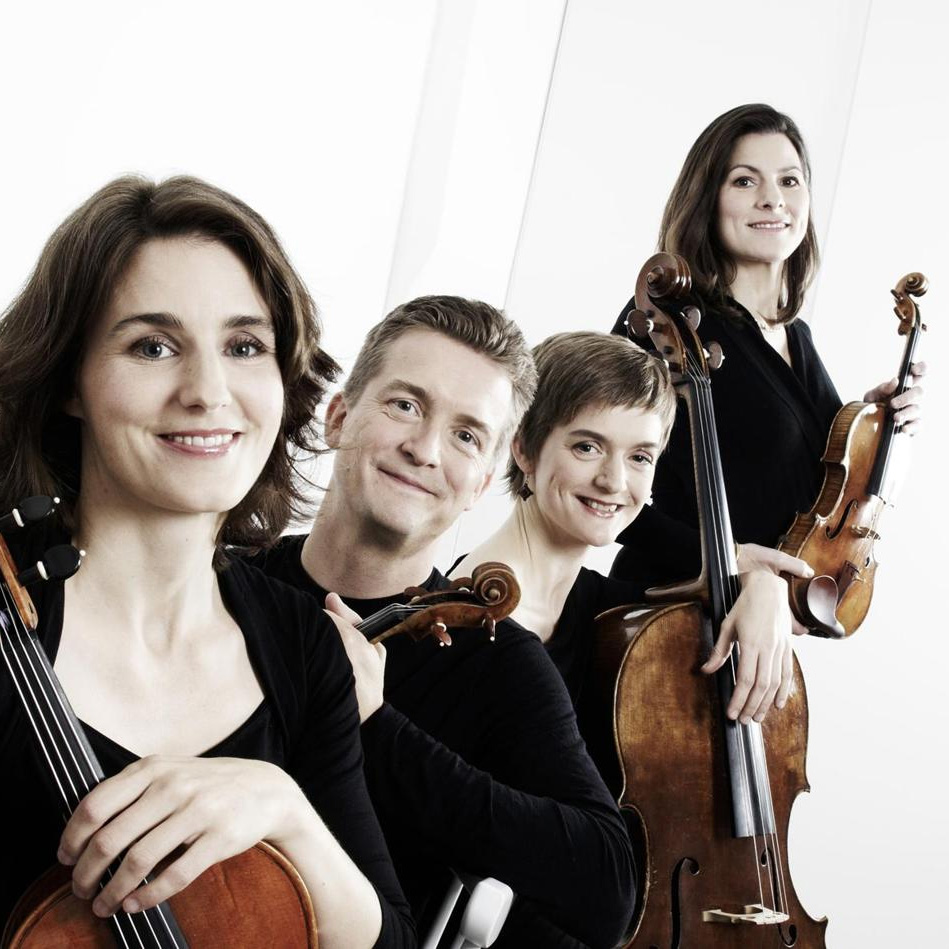by Daniel Hathaway

Speaking by telephone from her home in Hannover, Elisabeth Kufferath said she’s excited to return to Cleveland after many years. “I haven’t been back since I studied at CIM with Donald Weilerstein. It’s wonderful that we’re able to play in Cleveland as a quartet, and I’m hoping to get together at least briefly with Annie Fullard.”
Unlike other standing ensembles, the Tetzlaff Quartet only comes together for tours or for projects like Leif Ove Andsnes’ summer festival in Norway. “It’s a really special luxury that we all have our own lives. We live in different cities — Hanna lives in Zürich, Tanja lives in Bremen, and Christian lives in Berlin — and typically we play two extended tours per year. This time, we’re flying to Los Angeles and rehearsing there for three days before playing eight concerts in California, Cleveland, Cincinnati, Atlanta, Baltimore, and New York. It just didn’t make a lot of sense for most of us to travel to one of our houses to rehearse and then fly out, so we decided to meet in L.A., get over the jet lag, and rehearse there.”
The Tetzlaff Quartet traces its beginnings to 1992. “Our first concert was at a small, family-run festival at St. Gallen in the Austrian Alps,” Kufferath said. “Christian and I had known each other a long time — we went to the same high school in Hamburg and had the same violin teacher — and Tanja has been my best friend forever. When the second violinist who was supposed to play at the festival got sick, I lucked into a dream that has continued ever since.”
Twenty-five years ago, the fledgling quartet displayed all the devil-may-care qualities of youth. “The first piece we picked was the Schoenberg Quartet,” Kufferath said. “It’s our nature to take on big challenges. The second piece was the Schubert G-Major Quartet. I remember working on it during those festival days. It was incredibly hot, 40o Celsius, and we rehearsed it with great passion and too little time. All of that just added to the excitement, and we decided we wanted to stay together. We still consider ourselves something of a professional hobby quartet, because we just love playing together!”
From time to time, the Quartet dreams about performing more frequently, but there are advantages to limiting their concert activities. “The upside is that it just feels incredibly special every time we get to perform, because all of us have to fight for the time,” Kufferath said, adding, “we have thirteen children among us, so that’s an aspect, too.” Even the twice-a-year schedule requires much advance planning. “Just today we settled on a week’s tour in the Spring of 2020, so we usually have to think quite far ahead in order to include rehearsal days and make everything work.”
The Tetzlaff Quartet also carefully limits the repertoire they take on for tours. “This time it’s really quite comfortable, although the four pieces we’re playing are gigantic and challenging. In Cleveland, we’re playing the Mozart E-flat, Berg’s Op. 3, and the Schubert G Major. In Cincinnati and Atlanta, we’re playing Beethoven’s Op. 130 with the Große Fuge instead of the Schubert. We don’t make it easy for ourselves, but we love extremes.”
Kufferath noted that the Quartet loves all three of the pieces they’ll be playing in Cleveland. “The Schubert — the second work we ever played together — is a real journey through life and death and all things between. The Berg is quite a recent addition, and it’s really wonderful to go from the Lyric Suite, which we’ve played a lot and recorded, to this much earlier work. The emotional language, so passionate, romantic, and personal, is almost identical. Only the grammar has changed.”
Finishing our conversation, Elisabeth Kufferath mused about players maturing along with works they’ve played over a period of years. “It’s great to have pieces that you can go back to and never tire of. We feel that as we’ve grown older and more experienced and closer to each other as human beings, those pieces have grown and developed with us. It feels like a really good team.”
Published on ClevelandClassical.com November 7, 2017.
Click here for a printable copy of this article


